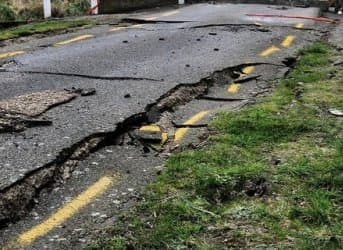The process of hydraulic fracturing is a mining technique which uses injected fluid to propagate fractures in a rock layer to release hydrocarbon deposits that would otherwise be uncommercial. Developed in the U.S. and first used in 1947 for stimulating of oil and natural gas wells, the use of “fracking” soared in the past decade as thousands of wells have been drilled into the Marcellus Formation, also referred to as the Marcellus Shale, a deposit of marine sedimentary rock found in eastern North America.
While initial environmental protests of the technique centered around its possibility of polluting underground water aquifers as a number of known carcinogenic substances are used in the procedure, more recently research has focused on an even more ominous byproduct of the technique – the increased possibility of earthquakes. While in the U.S. the U.S. Geological Survey and the state governments are investigating the link, in Britain the Department of Energy and Climate Change on 17 April published an independent expert report recommending measures to mitigate the risks of seismic tremors from hydraulic fracturing and invited public comment on its recommendations.
The report reviewed a series of studies commissioned by Cuadrilla, whose fracking operations in Lancashire aroused public debate, and the document “confirms that minor earthquakes detected in the area of the company’s Preese Hall operations near Blackpool in April and May last year were caused by fracking.” DECC’s Chief Scientific Advisor David MacKay remarked, “If shale gas is to be part of the UK’s energy mix we need to have a good understanding of its potential environmental impacts and what can be done to mitigate those impacts. This comprehensive independent review of Cuadrilla’s evidence suggests a set of robust measures to make sure future seismic risks are minimized - not just at this location but at any other potential sites across the UK.”
The report is certain to reopen debate about the Lancashire tremors, which on 1 April and 27 May 2011 shook the Blackpool area, registering 2.3 and 1.5 on the Richter Scale. On 2 November a report commissioned by Cuadrilla Resources, “The Geo-mechanical Study of Bowland Shale Seismicity,” acknowledged that hydraulic fracturing was responsible for the two tremors and possibly as many as fifty separate earth tremors overall, noting that it was “highly probable” that the hydraulic fracturing of its Preese Hall-1 well did trigger a number of “minor” seismic events.
At the time of the report’s release Cuadrilla Resources CEO Mark Miller said, “We unequivocally accept the findings of this independent report and are pleased that the report concludes that there is no threat to people or property in the local area from our operations. We are ready to put in place the early detection system that has been proposed in the report so that we can provide additional confidence and security to the local community. Cuadrilla Resources is working with the relevant local and national authorities to implement the report’s recommendations so we may safely resume our operations.”
The British Geological Survey also linked smaller quakes in the Blackpool area to fracking. BGS Dr. Brian Baptie said, “It seems quite likely that they are related,” noting, “We had a couple of instruments close to the site and they show that both events occurred near the site and at a shallow depth.”
While the DECC report confirms that Cuadrilla Resources 's test-fracking likely caused the 2011 two small tremors last year, it also said that Cuadrilla Resources could proceed with exploring the area if it follows a new set of expensive safety measures.
Cuadrilla Resources clearly sees the report as vindication, with Miller proclaiming, “We are pleased that the experts have come to a clear conclusion that it is safe to allow us to resume hydraulic fracturing, following the procedures outlined in the review. Many of today’s recommendations were contained in the original expert studies we published in November last year, and our supplementary information sent to DECC in January. We have already started to implement a number of the experts’ recommendations in the pursuit of best practice and look forward to the final decision by DECC ministers concerning the resumption of hydraulic fracturing following the six week period for public comment commencing on 17 April.”
And insurers in the City of London clearly believe that the DECC report validates fracking. City insurance brokerage Willis chief operating officer of global energy Neil Smith said, “Shale gas is here to stay… The issues are of a political nature and a lot are born out of ignorance of what the operations are.” Dominick Hoare of Watkins Syndicate at the Lloyd's of London insurance market was equally bullish, saying, "With a proper assessment it's a good risk to assume," as was Matt Yeldham, the head of casualty at Aegis' marine and offshore liability division, who commented, "Provided fracking is conducted in an appropriate fashion, it would appear on the whole to present a reasonable risk profile" before adding, "Underwriters are not there to cover long-term health hazard and other latent issues."
It is precisely those “long-term health hazard and other latent issues” that should be at the top of the British government’s concerns, but Westminster has repeatedly proven that its interests more closely align with those investment bankers in the City of London than those forced to live with the consequences if the environmental nay-sayers ultimately prove correct about water pollution and “seismic events.”
ADVERTISEMENT
By. John C.K. Daly of Oilprice.com


















